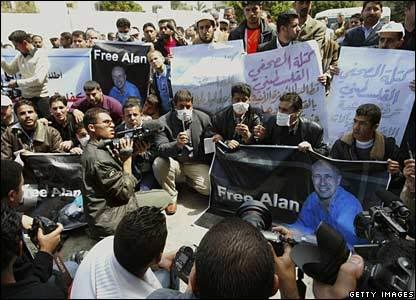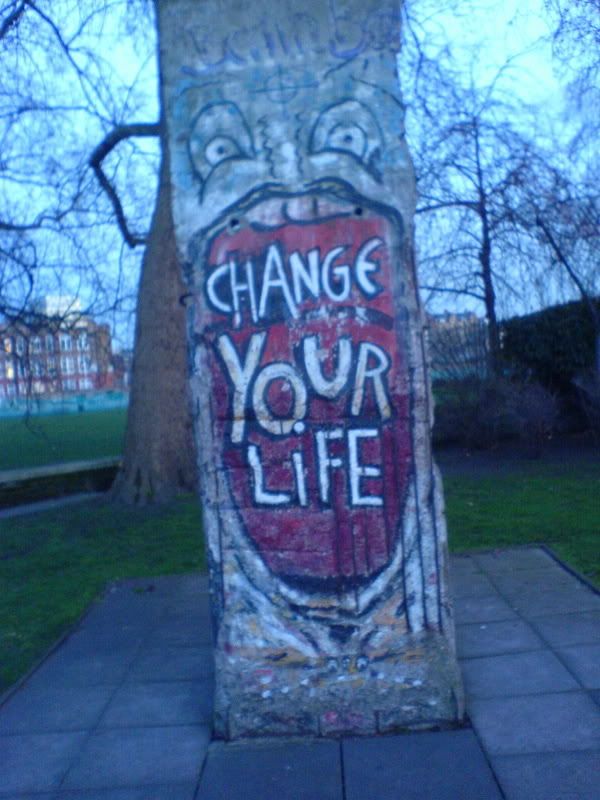Three hours ago the Jerusalem Post reported that a previously unknown Palestinian organisation identified with al-Qaeda has claimed that it has killed missing BBC reporter in the Gaza Strip, Alan Johnston.
The Palestinian Interior Ministry said it was checking the report but raised doubts as to its credibility. According to the ministry, recent information suggests that Johnston, who was kidnapped a month ago, is alive and well.
In the last month there have been protests, petitions, poster campaigns, personal pleas from Johnston's family, demands from the BBC and the chief of the UN urging for the release of the war correspondent. For the first time in media history, three channels simulcast. The BBC, al-Jazeera, and Sky News all broadcast a special live programme on the dangers facing journalists in Gaza.
The world is calling for his safe return home but this latest news could be the beginning of the end.
Sunday, 15 April 2007
Monday, 2 April 2007
Curiosity kidnapped the correspondent?
BBC war reporter Alan Johnston has now been missing for three weeks. Yesterday hundreds of journalists gathered in protest demanding that the 45-year-old be released. His assumed kidnap is the longest period any foreigner has ever been held in Gaza.
In yesterdays Guardian there was an ad published with 300 signatories asking that he be freed. The petitioners include Sir David Frost, BBC director general Mark Thompson, CNN chief international correspondent Christiane Amanpour, Jon Snow, Jeremy Paxman, John Humphrys and Sir Trevor McDonald. There is also an online petition launched by the BBC at Alan Johnston petition
Monday's Independent ran a news feature stating that Johnston had been begged to take a break after three years in Gaza but he was unable to stop.
In yesterdays Guardian there was an ad published with 300 signatories asking that he be freed. The petitioners include Sir David Frost, BBC director general Mark Thompson, CNN chief international correspondent Christiane Amanpour, Jon Snow, Jeremy Paxman, John Humphrys and Sir Trevor McDonald. There is also an online petition launched by the BBC at Alan Johnston petition
Monday's Independent ran a news feature stating that Johnston had been begged to take a break after three years in Gaza but he was unable to stop.
Palestinian journalists protest against Johnston's abduction
Wednesday, 28 March 2007
Change your life
Since embarking on this little voyage of discovery I have forsaken the Bronte sisters, Hunter S Thompson, Hemmingway and Orwell in favour of devouring anything any war reporter has ever had to say. Some are frankly dull, others are challenging but there are a few that have really grabbed me and transported me into the hyperreality of the world of war.
I had to immerse myself in it physically, I longed to see it and smell it. I went to the Imperial War museum, the closest I could get to anything like war from this western utopia that is relatively all I have ever known.
I did the ‘trench experience’. Shushing my companion, I closed my eyes in the drafty funereal façade letting the words of Jackie Spinner, author of Tell them I didn't cry wash over me, “The first mortar sailed over our heads, we barely glanced up. It seemed too far away. The second mortar shot over us, we looked up. 'That was close' I said, the words barely out of my mouth before a large crack and a flash of fire exploded over us. We looked at one another for a split second, a collective recognition on each of our faces. We were going to die”. I wanted to feel the cost of truth.
I had to immerse myself in it physically, I longed to see it and smell it. I went to the Imperial War museum, the closest I could get to anything like war from this western utopia that is relatively all I have ever known.
I did the ‘trench experience’. Shushing my companion, I closed my eyes in the drafty funereal façade letting the words of Jackie Spinner, author of Tell them I didn't cry wash over me, “The first mortar sailed over our heads, we barely glanced up. It seemed too far away. The second mortar shot over us, we looked up. 'That was close' I said, the words barely out of my mouth before a large crack and a flash of fire exploded over us. We looked at one another for a split second, a collective recognition on each of our faces. We were going to die”. I wanted to feel the cost of truth.
A piece of the berlin wall that stands outside the Imperial War museum in London
Friday, 16 March 2007
Dear Anonymous
Thank you for your contributions. You are shaping the debate, I will gradually be addressing all the issues you raise.
I know there are more anonymees out there, every time you hit this blog it inspires me to do more.
As long as you keep reading, I’ll keep writing.
Kx
I know there are more anonymees out there, every time you hit this blog it inspires me to do more.
As long as you keep reading, I’ll keep writing.
Kx
Stop the war?
There is a People's Assembly on Tuesday, 2:00 - 8:00pm at Central Hall Westminster in London. If you feel strongly about this, don't just say what you think in the pub go and be counted.
Stop the war
Stop the war
Iraq after Saddam
The Road to Kerbala is being screened at the Frontline club on Monday at 7.30pm. The film offers "insight into the heart of the long-oppressed Shia community of Iraq" as we are able to journey with them on a pilgrimage that was banned by Saddam. I'm told that it is excellent. I'll be there!
Tickets are £5 and you must register to book at Frontline club
Tickets are £5 and you must register to book at Frontline club
Thursday, 15 March 2007
A love like no other
I recently e-mailed Philip Knightley, an inspiration for this blog, telling him about it and asking if he could contribute his thoughts. He kindly offered to answer some of my questions but warned me that he has spent over 30 years immersed in the topic and he is yet to be free of it.
Mr Knightley recommended that I see a review in this weeks Mail on Sunday of a book by Anthony Loyd, Another Bloody Love Letter. Knightley described Loyd as "a war junkie, hooked on war reporting who loves the risk", and critique James Delingpole appeared to agree labelling Loyd "Britain's boldest, louchest war reporter".
Delingpole speaks of Loyd as the master of an art, "He'd had this odd feeling they were about to drive into a minefield... this is the sort of life-saving intuition it takes a war correspondent years to hone". Though it almost feels as if he is describing a game when he speaks of the "powers of Loyd's sixth sense" and explains that "within every battle there is a well-kept secret: 'The shared and terrible love of it all.'"
When reading the review I am struck by Delingpole's juxtaposition of the perceived glamour of war alongside the true grit and grime somehow unseen by mavericks like Loyd, "War offers to some men a seduction that no other experience can quite match".
Mr Knightley recommended that I see a review in this weeks Mail on Sunday of a book by Anthony Loyd, Another Bloody Love Letter. Knightley described Loyd as "a war junkie, hooked on war reporting who loves the risk", and critique James Delingpole appeared to agree labelling Loyd "Britain's boldest, louchest war reporter".
Delingpole speaks of Loyd as the master of an art, "He'd had this odd feeling they were about to drive into a minefield... this is the sort of life-saving intuition it takes a war correspondent years to hone". Though it almost feels as if he is describing a game when he speaks of the "powers of Loyd's sixth sense" and explains that "within every battle there is a well-kept secret: 'The shared and terrible love of it all.'"
When reading the review I am struck by Delingpole's juxtaposition of the perceived glamour of war alongside the true grit and grime somehow unseen by mavericks like Loyd, "War offers to some men a seduction that no other experience can quite match".
Subscribe to:
Posts (Atom)


